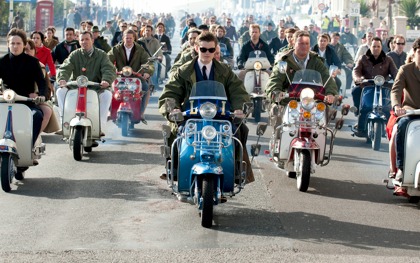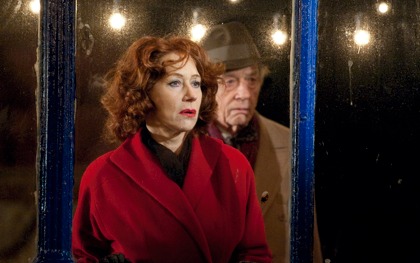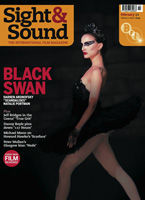Film review: Brighton Rock

Rowan Joffe’s new adaptation of Graham Greene’s underworld thriller – classically filmed by the Boulting brothers in 1947 – distinguishes itself by updating the milieu to 1964. Philip Kemp wishes it hadn’t copied the former film’s ending
And it was all going rather well too. In some quarters Rowan Joffe’s Brighton Rock has been attacked for not being the Boulting brothers’ version of 1947, and Sam Riley (Ian Curtis in Anton Corbijn’s Control) for not being Richard Attenborough. But as Joffe has always made clear, this isn’t a remake of the Boultings’ film; it’s a new adaptation of Graham Greene’s 1938 novel. And as such it works well enough on its own terms. Until it doesn’t.
In some ways Joffe’s screenplay improves on Greene’s original, tying the various relationships closer together. Ida Arnold, the avenging fury determined to track down the killers of the hapless Fred Hale, is no longer just a woman he meets by chance in a pub, but his friend and ex-lover, as well as proprietress of the café where Rose, the girl who gets involved with Hale’s teenage killer Pinkie, works as a waitress. Too much coincidence? Perhaps, but it reinforces the sense of Brighton’s demi-monde as a dangerously claustrophobic world where one action can set up tremors along a whole web of near-incestuous relationships.
Joffe unashamedly plays up the story’s elements of noirish melodrama, abetted by Martin Phipps’s tumultuous score. The sea is shot to look turbulent and oil-dark, and the camera swoops and plummets like a drunken seagull; one overhead clifftop shot of Rose and Pinkie is pure Titanic-style kitsch. The updating to 1964, year of the Mods and Rockers clashes, doesn’t harm the narrative, and allows for a moment of incongruous humour – Pinkie, having stolen a scooter as a getaway vehicle, finds himself heading a Mod procession along the seafront – as well as enhancing the overall theme of futile violence. Sam Riley, less scarily dead-eyed than Attenborough but more broodingly malicious, makes an effective Pinkie, while Andrea Riseborough brings a welcome hint of steel to the potentially over-passive role of Rose. They’re backed by a practised cast of quality British acting: Helen Mirren as Ida, Phil Davis, John Hurt and, in a smoothly malevolent cameo, Andy Serkis as gang boss Colleoni.

The film features, but mostly doesn’t overplay, the novel’s warped brand of Catholicism: both Rose and Pinkie are Catholics and Pinkie, like his creator, finds it easier to believe in hell than in heaven. But it’s this strand that finally sinks Joffe’s movie. After Pinkie has married Rose to make sure she can’t testify against him, she sees a ‘record-your-voice’ machine on the pier and asks him to make a recording for her.
He records a message saying how much he loathes her. In the novel, Greene has Rose going home after Pinkie’s violent death to play the record for the first time. “She walked rapidly in the thin June sunlight towards the worst horror of all” – the novel’s final sentence.
The Boultings recoiled from Greene’s bleakness. In their film the gramophone needle sticks on Pinkie’s message (“You want me to say I love you – but I hate you”) repeating “I love you – I love you – I love you,” while the camera tilts up to a crucifix on the wall. The new film reproduces this cheaply sentimental resolution unchanged, complete with tilt to the crucifix and an angelic choir on the soundtrack. It’s a major miscalculation – and makes ultimate nonsense of Joffe’s claim not to be remaking the 1947 film.
See also
That was then, this is now: Mark Duguid identifies a new ‘golden generation’ of gifted (June 2010)
Murder in Reverse? remembered by crime novelist Cathi Unsworth (June 2010)
The Fallen Idol reviewed by Philip Kemp (August 2006)
Eager beaver: Richard Attenborough talks to Geoffrey Macnab (September 2003)
Get smarter: Danny Leigh bemoans the cheap nostalgia of a new wave of British crime films (June 2000)
The End of the Affair reviewed by Philip Kemp (February 2000)
The Vienna project: Peter Wollen explores the dramatic true-life tale behind The Third Man (July 1999)



